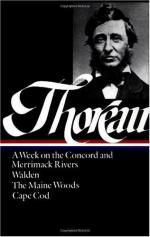Let us here read what old Johnson says of these meadows in his “Wonder-working Providence,” which gives the account of New England from 1628 to 1652, and see how matters looked to him. He says of the Twelfth Church of Christ gathered at Concord: “This town is seated upon a fair fresh river, whose rivulets are filled with fresh marsh, and her streams with fish, it being a branch of that large river of Merrimack. Allwifes and shad in their season come up to this town, but salmon and dace cannot come up, by reason of the rocky falls, which causeth their meadows to lie much covered with water, the which these people, together with their neighbor town, have several times essayed to cut through but cannot, yet it may be turned another way with an hundred pound charge as it appeared.” As to their farming he says: “Having laid out their estate upon cattle at 5 to 20 pound a cow, when they came to winter them with inland hay, and feed upon such wild fother as was never cut before, they could not hold out the winter, but, ordinarily the first or second year after their coming up to a new plantation, many of their cattle died.” And this from the same author “Of the Planting of the 19th Church in the Mattachusets’ Government, called Sudbury”: “This year [does he mean 1654] the town and church of Christ at Sudbury began to have the first foundation stones laid, taking up her station in the inland country, as her elder sister Concord had formerly done, lying further up the same river, being furnished with great plenty of fresh marsh, but, it lying very low is much indamaged with land floods, insomuch that when the summer proves wet they lose part of their hay; yet are they so sufficiently provided that they take in cattle of other towns to winter.”
The sluggish artery of the Concord meadows steals thus unobserved through the town, without a murmur or a pulse-beat, its general course from southwest to northeast, and its length about fifty miles; a huge volume of matter, ceaselessly rolling through the plains and valleys of the substantial earth with the moccasoned tread of an Indian warrior, making haste from the high places of the earth to its ancient reservoir. The murmurs of many a famous river on the other side of the globe reach even to us here, as to more distant dwellers on its banks; many a poet’s stream floating the helms and shields of heroes on its bosom. The Xanthus or Scamander is not a mere dry channel and bed of a mountain torrent, but fed by the everflowing springs of fame;—
“And thou Simois, that
as an arrowe, clere
Through Troy rennest,
aie downward to the sea";—
and I trust that I may be allowed to associate our muddy but much abused Concord River with the most famous in history.
“Sure there are poets
which did never dream
Upon Parnassus, nor
did taste the stream
Of Helicon; we therefore
may suppose
Those made not poets,
but the poets those.”




